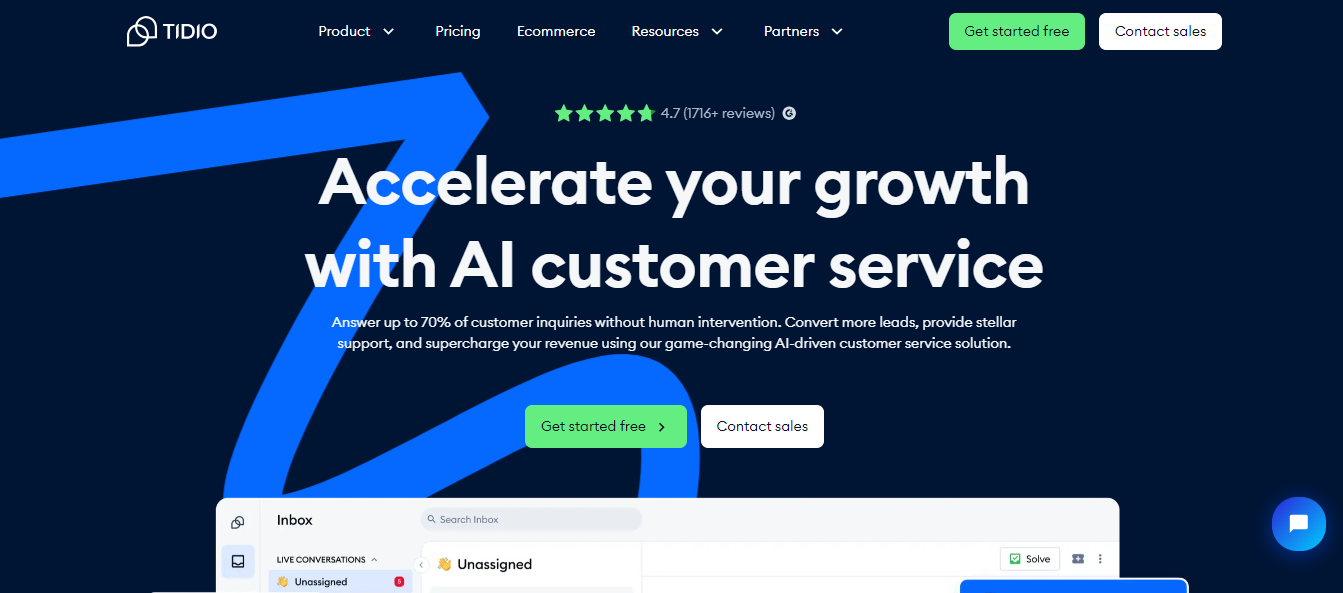
Tidio vs Zendesk: Which Is Better for Customer Service?

As your business grows, handling the increasing number of customer inquiries each day can become daunting.
A good customer support tool can ease this burden by managing these inquiries and maintaining high customer satisfaction.
Both Tidio and Zendesk offer solutions to simplify customer communications, but they cater to different needs and scales of business operations.
These limitations may lead you to consider other alternatives.
In this article, we'll compare Tidio and Zendesk and examine their features, advantages, and limitations to help you determine which is best for your business needs.
If neither of the two seems to fit your requirements, we'll introduce Denser.ai, which integrates the essential features of Tidio and Zendesk. This tool uses advanced AI to provide deeper insights and proactive customer support.
What is Tidio?#
Tidio is a customer support platform that offers live chat, a ticketing system, and social media integration. It allows you to handle all customer interactions in one place.

Tidio also comes with an email management system to ensure customer emails are tracked and responded to. Both mobile and desktop apps are available, so support reps can assist customers from anywhere.
What is Zendesk?#
Zendesk is an AI-powered service platform that's quick to set up and flexible to change, which is ideal for fast-paced business environments. It uses advanced AI to improve team efficiency and achieve greater accuracy.
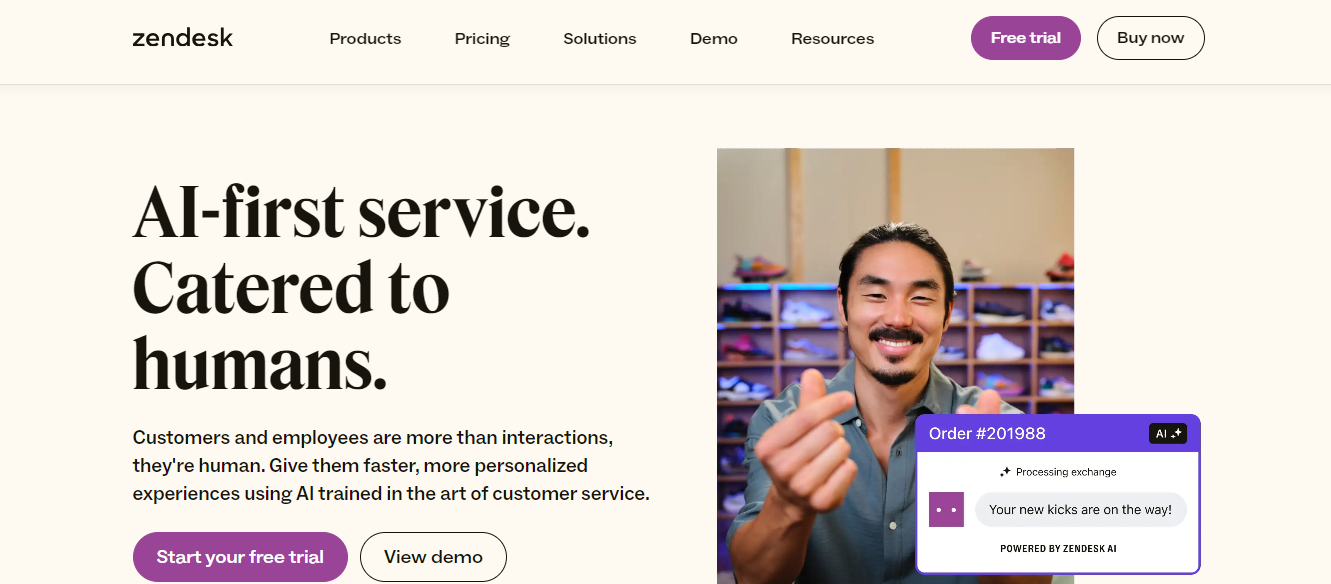
Built on a foundation of billions of customer interactions, Zendesk's AI is integrated throughout the service process, supporting everything from self-service to administrative tasks.
Zendesk Support is a widely used customer service platform designed to improve customer support processes.
It offers many features, including multichannel communication, a ticketing system, data management, and collaboration tools.
Key Features Comparison: Tidio vs Zendesk#
Both Tidio and Zendesk offer a range of plans with diverse features. While many of these features may seem appealing initially, it's important to identify which ones align with your business needs.
Here's a detailed comparison of both tools so you can fully use all the features included in your chosen plan:
User Interface and Ease of Use#
Zendesk features a user-friendly interface with detailed analytics to monitor and improve support team performance.
Its sleek design helps users navigate through its various features, ideal for businesses that need comprehensive insights.
Tidio offers a simple, clean, robust, and customizable interface. This makes it particularly user-friendly and suitable for smaller teams or businesses that require a less complex but flexible tool.
Denser.ai also combines a clean, intuitive design with powerful AI-driven functionalities that improve the user experience. It simplifies complex processes and makes advanced customer interaction tools accessible, even to those with minimal technical expertise.
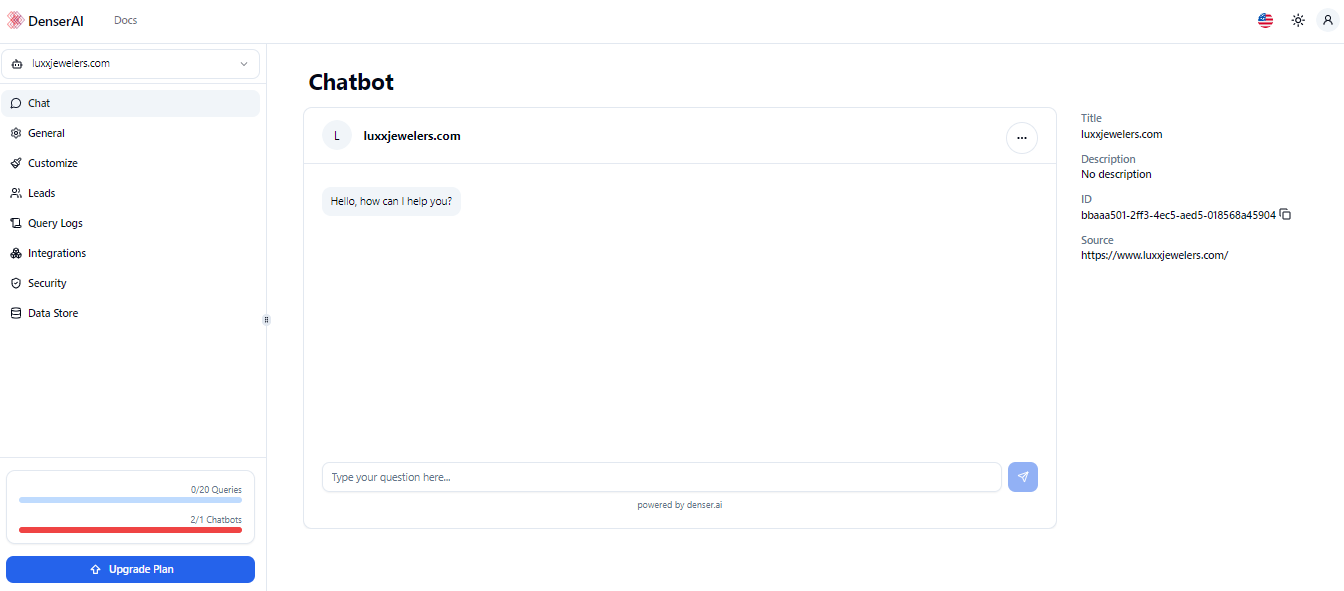
Automation and AI Capabilities#
Tidio uses AI and machine learning to make its chatbots smarter. The AI helps chatbots understand customer questions better, even if there are typos.
This feature is great for businesses that want to automate their customer service without losing quality in interactions.
Zendesk uses AI to manage customer service tickets more efficiently. It automatically sends tickets to the right agents, saving about 45 seconds per ticket compared to doing it manually.
Denser.ai features advanced semantic AI, allowing its chatbots to better understand and respond to customer queries. It automates routine tasks using these intelligent chatbots, which helps free up human agents to focus on more complex issues.
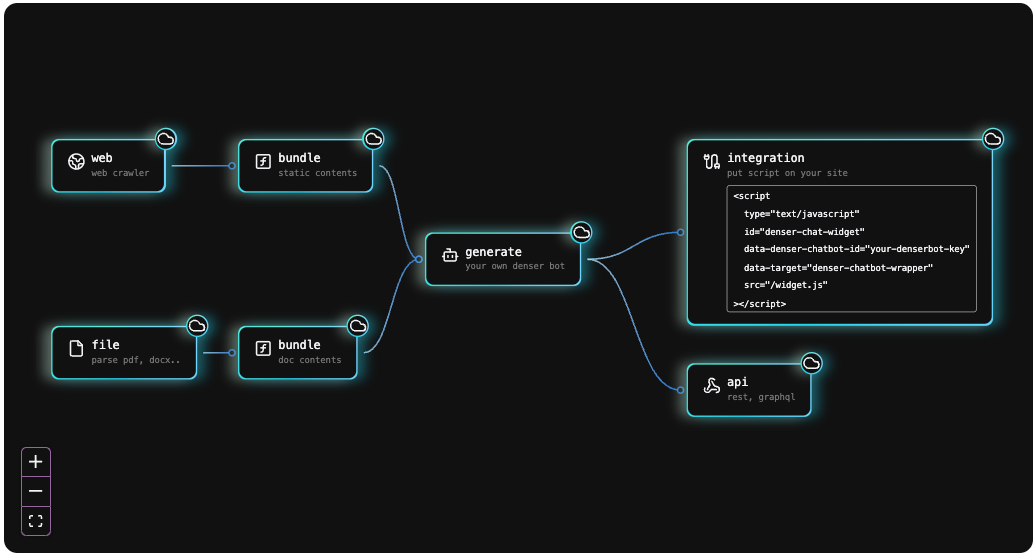
Integration and Compatibility#
Tidio integrates with a variety of popular tools, including Shopify, WordPress, and Mailchimp. Zendesk also boasts an extensive list of integrations that support connections with CRM systems like Salesforce, HubSpot, and Google Workspace.
Denser.ai is specifically designed to work with e-commerce and content management systems like Zapier, Shopify, and WordPress to cater to its utility for a wide range of businesses.

Integrating Shopify and WordPress requires simply pasting a snippet of code into the website's backend. Businesses can quickly start using this tool's powerful conversational AI features without needing extensive technical expertise.
Customization and Personalization#
Tidio allows users to customize the appearance of the chat widget to match their website's branding.
Zendesk allows web-savvy admins to customize their help center. Admins can modify page code to create tailored themes that include editable templates for different pages, such as article, category, or community topic pages.
Denser.ai offers a highly customizable chatbot builder that allows you to program specific questions and answers tailored to your customers' needs.
Beyond simply setting up these interactions, the platform also provides tools to train your chatbot, ensuring it responds accurately and effectively to customer queries.
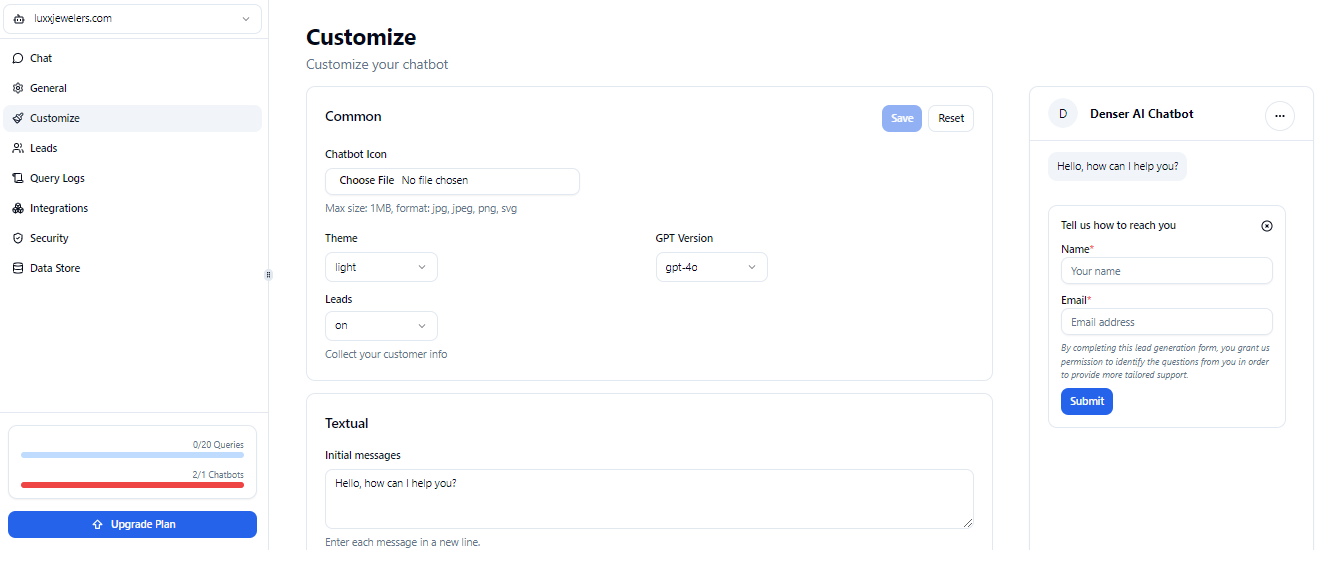
Pricing Comparison: Tidio vs. Zendesk#
When evaluating customer support, you have to thoroughly compare their pricing plans. Both platforms offer various plans that include different features and capabilities.
If you don't carefully assess these plans, you may overlook certain areas that are essential for your business's needs.
Here's a quick guide to Tidio and Zendesk's pricing structures:
Tidio Pricing Plans#
Tidio offers various pricing plans tailored to different business needs, ranging from free to premium options:
- Free Plan: Ideal for startups and offers the essential tools needed
- Starter Plan (29 USD/month): Ideal for small businesses focusing on customer interaction through live chat
- Growth Plan (59 USD/month): Great for any size team that prioritizes customer service to gain a competitive edge
- Solution for Established Businesses (2999 USD/month): Targeted at large enterprises that provide extensive features, customization options, and premium support
Zendesk Pricing Plans#
Zendesk also offers a range of pricing plans designed to accommodate businesses of all sizes, from small startups to large enterprises.
- Suite Team ($55/month): Offers tools that are easy to set up and ready to use. It includes a ticketing system, email, chat, voice, social messaging, and more.
- Suite Growth ($89/month): Helps businesses improve their efficiency with better self-service options and automation.
- Suite Professional ($115/month): Includes advanced tools for optimizing team operations. Any features from Suite Growth are included.
- Suite Enterprise (Contact for pricing): Offers customized features like AI-driven content suggestions and detailed access controls for large businesses.
Denser Pricing Plans#
Denser.ai offers better pricing plans to meet different business needs, ranging from startups to large enterprises.
The Free Plan is great for startups wanting to try basic features without any cost. The Starter Plan costs $19 per month and is ideal for individual users or small startups needing essential features. The Standard Plan, at $89 per month, is designed for small teams looking for more advanced features.
The Business Plan, priced at $799 per month, is for larger businesses that require a comprehensive feature set.
Analyzing the Cost-Benefit#
When comparing Tidio's and Zendesk's pricing plans, it's important to consider the value each tool brings at different price points.
Small Businesses and Startups#
Tidio's Free Plan is great for businesses just starting since it's free, but it may lack the advanced features needed as businesses grow. Zendesk offers more comprehensive features but at a higher cost, which might not be affordable for smaller teams.
Denser.ai strikes a balance by providing advanced features like semantic AI at more affordable price points. Small businesses can start with a basic plan and access more sophisticated tools as they grow without a steep increase in cost.
Growing Businesses#
Denser.ai offers advanced features such as sophisticated AI chatbots and automation at a competitive price, providing great value without a huge investment.
Unlike Tidio, which mainly offers live chat, Denser.ai's semantic AI technology allows for a deeper understanding of customer inquiries. It also provides more integration options and scales for your business than Tidio.
Compared to Zendesk, which focuses on advanced ticketing and analytics, Denser.ai delivers similar functionalities but is more budget-friendly and easier to set up and use.
Large Enterprises#
While Tidio Growth offers comprehensive features and dedicated support, it might not be sufficient for large enterprises requiring more intricate systems and capabilities.
Zendesk's Enterprise Plan is great for large-scale operations for extensive customization and advanced AI features. However, Denser.ai stands out by combining these extensive features with greater flexibility and potentially more cost-effective pricing.
It provides robust features, including advanced AI capabilities, deep customization options, and the ability to manage multiple brands and large volumes of interactions.
What Makes Denser Stand Out?#
Managing customer support can take up a lot of time for online store owners. Tidio and Zendesk provide powerful features. However, their complex pricing, limited Shopify integration, and inadequate collaboration features might not fully suit your business needs.
Compared to Tidio or Zendesk, which are great for basic chat services and customer support management, Denser.ai provides a more well-rounded solution at a better price.
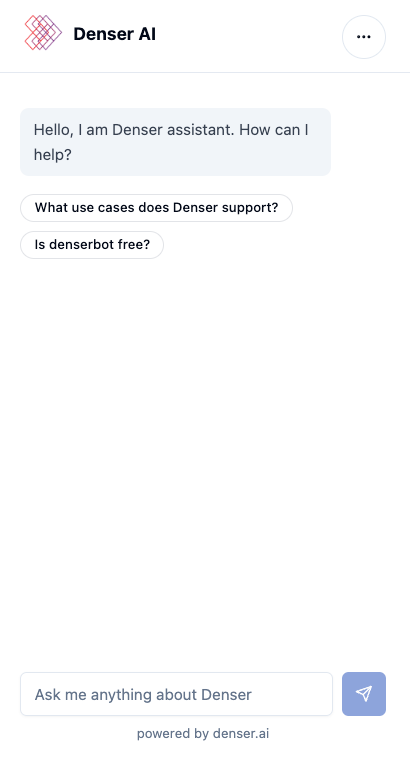
Denser.ai stands out with its sophisticated technology, which understands and responds to customer questions. It can handle conversations with customers more effectively and catch the nuances in their queries.
This platform can also personalize interactions and adjust its responses based on what it learns about each customer's preferences. It communicates through multiple channels, such as websites, mobile apps, and social media, for a consistent customer experience.
The platform's robust APIs make CRM integration easy and include tools to manage internal documents.
Security is a top priority for Denser.ai. It uses strong security measures to protect customer information and adheres to strict privacy laws to ensure data is handled safely.
Whether your business is small or large, Denser.ai's all-in-one solution can grow with you, offering an all-in-one support system that improves customer engagement.
Get Ahead of the E-Commerce Curve with Denser.ai#
Upgrade your e-commerce store with Denser.ai's easy-to-use chatbot tool.
While Tidio and Zendesk offer valuable tools, Denser.ai provides a superior alternative with extensive features that are not burdened by high costs.
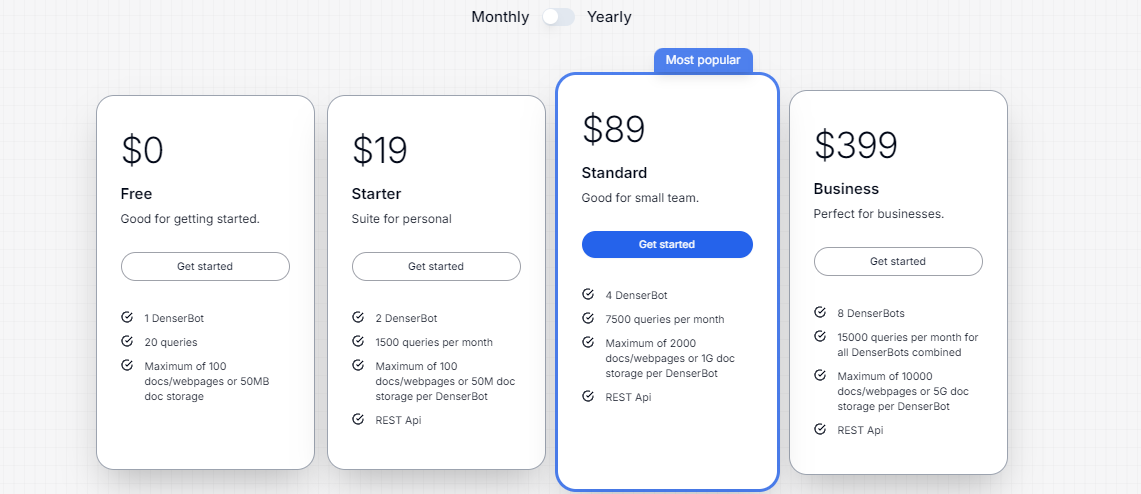
With this AI chatbot, you're creating a shopping experience that keeps customers coming back. It learns from your customers' choices to offer more of what they like, which means happier customers and more sales for you without the extra hassle!
Sign up for Denser.ai now and discover how easy it is to improve customer support and boost your sales.
FAQs About Tidio vs Zendesk#
Are there industry-specific solutions available with Tidio or Zendesk?#
Zendesk tailors its features to various industries, such as technology, retail, and healthcare, and it provides specialized tools and integrations. While generally versatile, Tidio is particularly effective for eCommerce businesses due to its deep Shopify integration capabilities.
What training resources are available for Tidio and Zendesk?#
Zendesk offers a comprehensive range of training resources and a detailed knowledge base that helps new users understand how to maximize the platform's features.
Tidio provides easy-to-follow online tutorials and documentation, making it convenient for smaller teams to get started quickly.
Are Intercom and Zendesk similar?#
Yes, both are platforms designed to help with customer communication, though they have different strengths and features.
Zendesk is ideal for customer support systems like ticketing and live chat and suits businesses of all sizes. Intercom is great for real-time, conversational engagement and integrates directly into websites and apps for immediate communication.